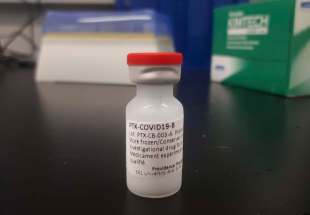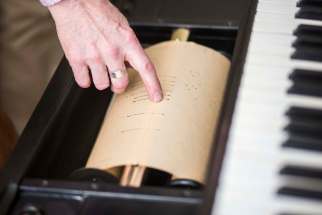The one to beat in Tokyo’s heat? Oak Bluff's Tyler Mislawchuk has his eyes on the prize at the Summer Games in July
Read this article for free:
or
Already have an account? Log in here »
To continue reading, please subscribe:
Monthly Digital Subscription
$0 for the first 4 weeks*
- Enjoy unlimited reading on winnipegfreepress.com
- Read the E-Edition, our digital replica newspaper
- Access News Break, our award-winning app
- Play interactive puzzles
*No charge for 4 weeks then price increases to the regular rate of $19.00 plus GST every four weeks. Offer available to new and qualified returning subscribers only. Cancel any time.
Monthly Digital Subscription
$4.75/week*
- Enjoy unlimited reading on winnipegfreepress.com
- Read the E-Edition, our digital replica newspaper
- Access News Break, our award-winning app
- Play interactive puzzles
*Billed as $19 plus GST every four weeks. Cancel any time.
To continue reading, please subscribe:
Add Free Press access to your Brandon Sun subscription for only an additional
$1 for the first 4 weeks*
*Your next subscription payment will increase by $1.00 and you will be charged $16.99 plus GST for four weeks. After four weeks, your payment will increase to $23.99 plus GST every four weeks.
Read unlimited articles for free today:
or
Already have an account? Log in here »
Hey there, time traveller!
This article was published 12/05/2021 (1673 days ago), so information in it may no longer be current.
We all have our heroes.
Tyler Mislawchuk found his in 2008 while watching TV coverage of the Beijing Summer Olympics. He was 14.
THE ROAD TO TOKYO
In the weeks leading up to the scheduled start of the Games in Tokyo, the Free Press will profile the elite Manitoba athletes who will be taking part in the Summer Olympics or Paralympics. In this instalment, we profile Oak Bluff’s Tyler Mislawchuk, Canada’s sensational medal prospect in triathalon.
“I hadn’t really watched much triathlon at all, but all I knew was this Canadian in a spandex suit was in fourth place and I was screaming at the TV and I was on the phone to my dad in China,” says Tyler.
“I was kind of explaining with play-by-play because anyone who knows my dad knows he’s just a huge sports fanatic.”
The spandex-wearing star was Simon Whitfield, who went on to earn his second Olympic medal — a silver — in a thrilling finish, almost matching the gold he had captured by swimming 1,500 metres, cycling 40 kilometres and running 10 kilometres in Sydney eight years earlier.
Tyler’s dad, Fred, a longtime camera operator for TSN in Winnipeg, had been working for the host broadcaster at the Beijing boxing venue. But having a choice between watching the men’s triathlon in person or a tourist trip to the Great Wall on an off day, he opted for the latter. Fred could hardly have known that watching Whitfield’s furious finish would be life-altering experience for his son.
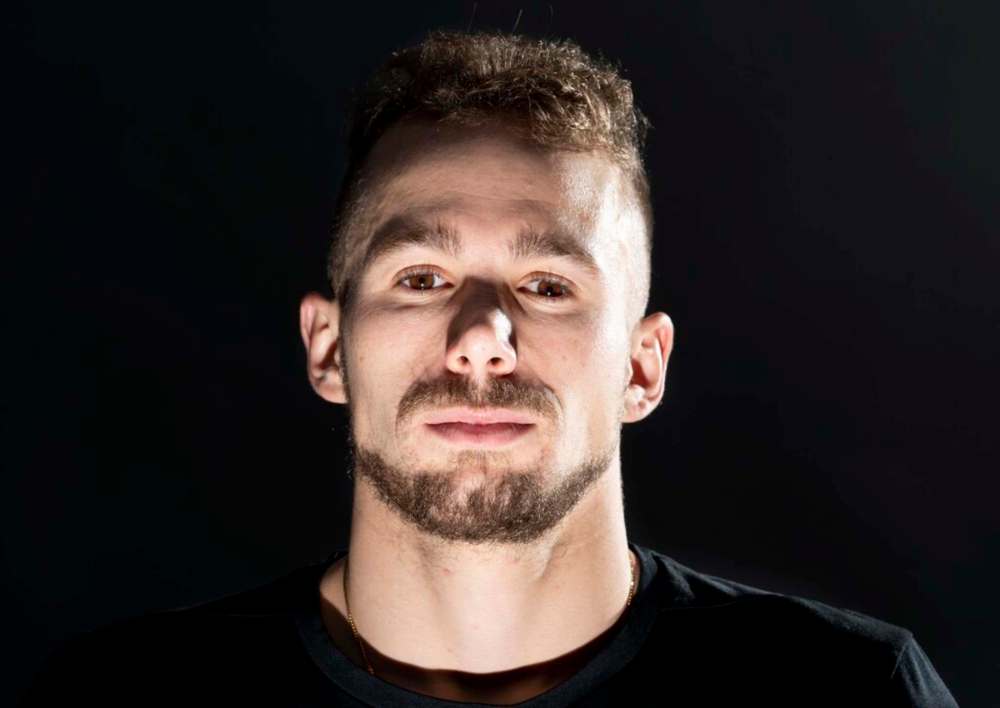
A scrawny gym and rink rat who had dabbled in almost every sport possible, Mislawchuk was curious about the strange multi-discipline sport. Shortly after Whitfield’s silver-medal performance, he competed in his first triathlon event. By the fall of 2009, he had joined the Manitoba National Triathlon Centre.
During his rise through Triathlon Canada and the world rankings, Mislawchuk often references Whitfield, now retired from the sport, as a role model.
In 2013, they met up at an event.
TYLER MISLAWCHUK’S OLYMPIC FILE
• Age: 26
• Hometown: Oak Bluff
• Olympic event: triathlon
• Rio 2016: 15th place (1:47:50)
• World ranking: Fifth
• By the numbers: 63 international starts, 10 podium finishes, five victories.
“He was retired, I was still a young junior and he saw something in me and asked if we could go for coffee,” says Mislawchuk. “He was my idol, so I remember just being so nervous. Like going on a first date.”
The nerves quickly melted away.
“I think one of the things that is great about Simon is he really does listen to you — he asks questions and listens and responds when appropriate,” says Mislawchuk. “I think one of the things that he said to me and I might be misquoting slightly, but the premise of it was just, ‘Don’t get caught up in a specific day or race or anything like that. It’s a long journey.’ He also said, ‘Enjoy what you’re doing because before you know it, it’s gonna be over.'”
For the Olympic hero, inspirational connections are not uncommon. Whitfield had his own — a chance meeting with Canadian decathlon great Dave Steen in his early teens — but he’s been on the other end of it, too.
“I can relate to those kind of things,” Whitfield says from his home in Victoria. “You have people in your life that you see that do something, (for me) it might have been Daley Thompson as a kid winning the (Olympic) decathlon. They open up something in your head that makes you think, ‘Maybe I could do that, too.'”
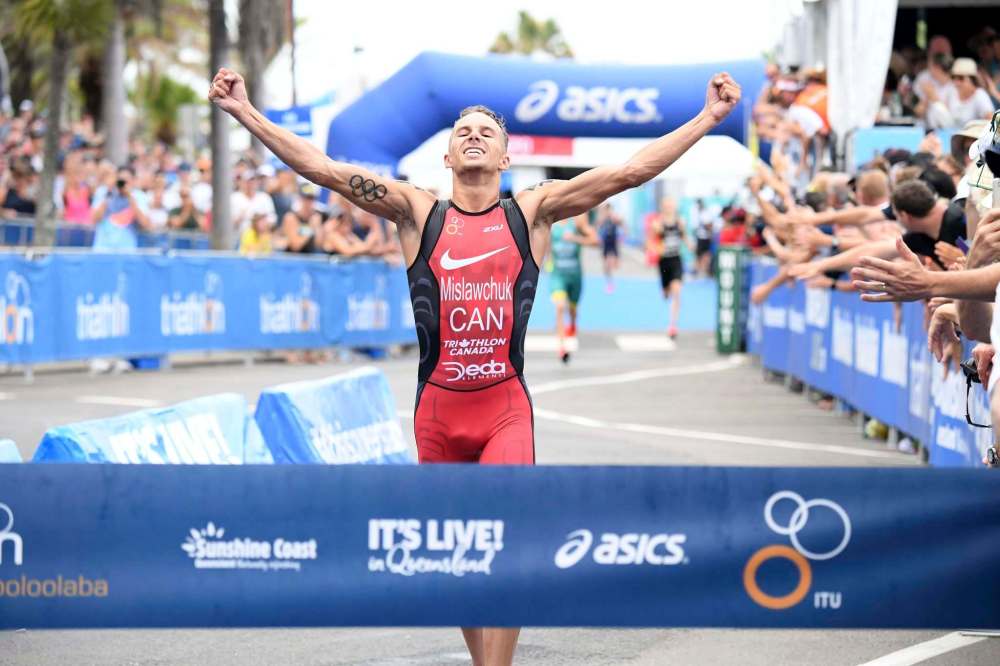
Steen signed Whitfield’s race-bib number that day and it remains a treasured memento.
“I’ve got this race number with Dave Steen saying, ‘Make your dreams come true,'” he says. “Those moments, I’ve had mine with people, too.”
Mislawchuk could be on the verge of a dream season.
Although he has not competed since finishing ninth at the World Cup race in Malta in 2019 due to pandemic, he’s spent the last 15 months refining the body that carried him to a signature win in the Tokyo test event on the Olympic course. A 12-month delay to the Olympics, while disruptive to his training plans, could be a major edge.
“Every 12 months or even every month counts to becoming a more mature, stronger, (a) more competition-hardened ready athlete and so in this case, it certainly worked to our advantage,” says Jonathan Hall, a native Australian who has been his personal coach and the Triathlon Canada boss since Mislawchuk’s 15th-place finish at the Rio Olympics.
“He was my idol, so I remember just being so nervous. Like going on a first date.” – Tyler Mislawchuk on meeting Olympian Simon Whitfield for a coffee
Considering his late start in the sport, Mislawchuk was touted as a major medal threat for the 2024 Games.
“Given Tyler’s age, given his maturation — I mean, he was a late developer as a male athlete — 2024 will be when he will be in absolute peak of his form,” says Hall.
“I think what we’ve done is we’ve pointed out and others have pointed out that 2024 is going to be him at his best. He’s obviously more than competitive and he put himself in position for 2020 and 2021 with this towering trajectory to be a medal contender and a gold-medal contender.
“It’s not necessarily something we aim for but it’s a place we’ve arrived at.”

Whitfield chuckles when he hears rivals suggest Mislawchuk’s best days are still years away.
“I think that people thinking that or saying that were hoping they could convince him that it was true,” says Whitfield. “They were like, ‘Hey, you’re going to be good in four years, so don’t be so good now.’ It sets him up really well. He’s in a beautiful position and he earned it. Whether it’s about where he’s from (or) his folks, you can get the sense that he’s quite grateful for it all and he’s quite humble about it.”
Mislawchuk, currently fifth in the world rankings, has no interest in squandering the opportunity.
He recently travelled to Arizona for training after a four-month stretch in Hawaii. In each locale, he and his training partners were trying to simulate the sweltering conditions expected in Tokyo on race day, July 26.
Staying away from COVID-19 hotspots was also a chief consideration, and their timing has been impeccable so far. Mislawchuk has stayed virus-free, with plans to be vaccinated sometime before the Games.
On May 22, he will compete in Lisbon, Portugal, his first World Cup event in 19 months. Two more races — one in Mexico and another in California — will complete the pre-Olympic schedule. He could decide to participate in all three.
“I need to get in a few races, because I haven’t raced in almost two years so it’s pretty important that I rehearse those skills,” he says.
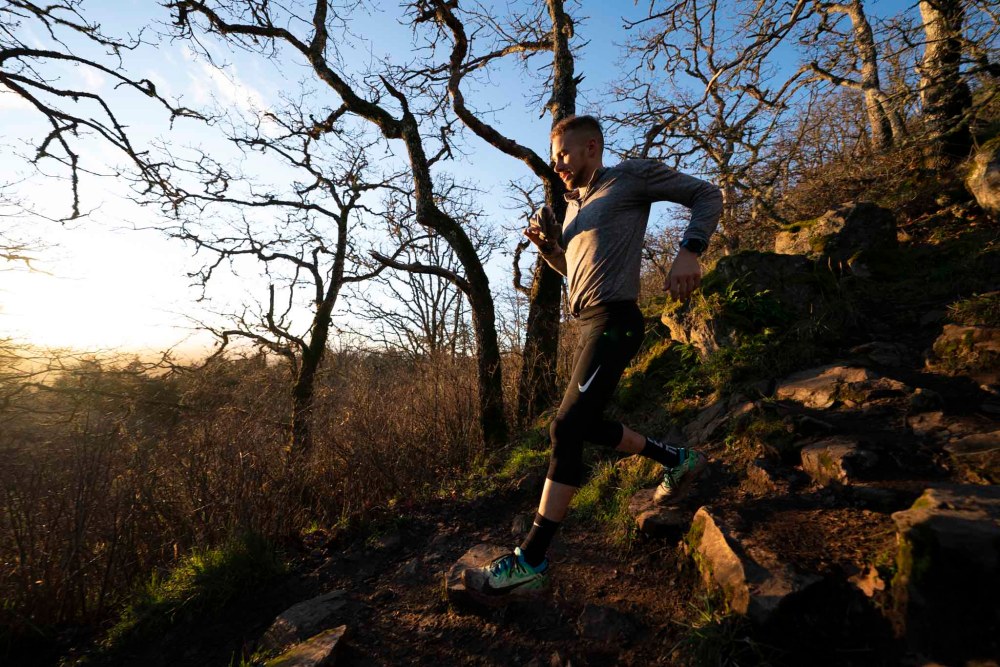
The competitive layoff isn’t a big deal, his coach suggests.
“He’s done a lot of work in trying to make sure that he’s not rusty on his first race and then we still have this 2 1/2-month period to get ready for the big event,” says Hall.
“So, while there hasn’t been a lot of competition — the playing field isn’t that uneven. And again, it’s allowed us to do things that we maybe wouldn’t have been able to do in a regular kind of the year.”
The most significant change has been to Mislawchuk’s body. After racing for several years at 130 pounds, he’s currently carrying 145 on his 5-foot-8 frame.
Despite stellar competitive seasons in 2018 and 2019, Hall’s message to Mislawchuk was he wasn’t strong enough. He dismissed the notion that heavier and stronger necessarily meant he would be slower.
The intent of the weight gain was to bring his swimming and cycling performances up to the level of his blistering ability in the run.
“The extra weight is just really about strength,” says Hall. “Because the race is so based on the run, athletes and coaches tend to look at replicating the body type of runners.”
Mislawchuk is a believer, saying the training results bear that out.
“I’m actually quite a bit stronger in terms of all three sports and just body composition, as well,” he says. “Being able to step away from racing and really focus on getting strong. So as well as being a better swimmer, better on the bike and (a) runner, I probably look a bit different.”
Hall makes a crucial point: Tokyo is shaping up to be the hottest and most humid Games in Olympic history.
“He’s obviously more than competitive and he put himself in position for 2020 and 2021 with this towering trajectory to be a medal contender and a gold-medal contender.” – Triathlon Canada boss Jonathan Hall
“Tyler, I believe, will be standing when others will be on their hands and knees,” he says. “You make the most of those things you’re born with and there’s a few things in Tokyo that that align with who Tyler is and what his parents and grandparents gave him as far as genetics, and we’re gonna make the most of it.”
Mislawchuk has an uncanny gift for a kid from the Canadian Prairies to race in the heat, which Hall says is equivalent to Dutch cyclists who have beast-like ability to climb in the Alps, or Australian athletes’ penchant for handling extreme cold.
“I mean, for the heat in Tokyo, it certainly sets him up well,” adds Whitfield. “I think that plays into a bit of the way he races. He just has this ability to appear at the right time.”
Fatigue is an important factor in triathlon races but staying injury free is just as crucial. When Hall took over the national team five years ago, he found a group of athletes often too injured or ill to compete at a high level.
Mislawchuk, for instance, ran in the Rio Olympics with an undiagnosed hip injury. After the Games, he spent eight weeks on crutches and two more using a cane while in recovery.
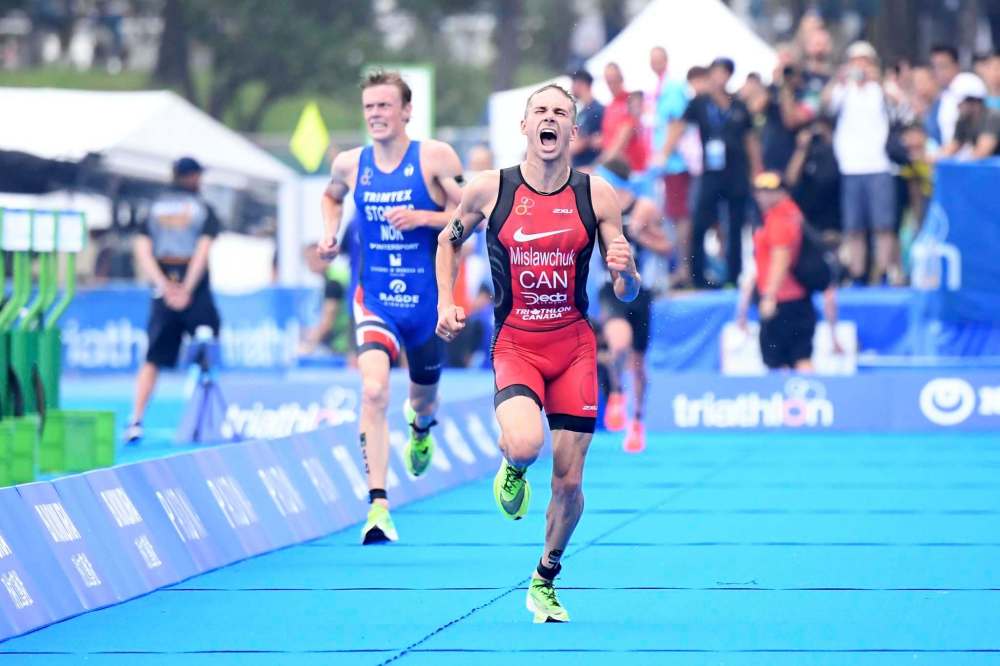
It’s a scenario Hall wants to avoid at all costs. Over-training, he says, is an all-too-common pitfall for elite athletes.
“We need to be looking after the athlete’s well-being, both physically and mentally,” he says. “And we need to be focusing on keeping them healthy.
“And knowing that when you have a world-class athlete, they’ll take care of business themselves if they’re healthy and I think what happens is coaches and athletes fall into the trap of taking something that’s very good and trying just to squeeze that little bit more out of it, and then finding themselves in a situation where they actually come away with nothing.”
As a result, Mislawchuk follows a carefully prepared training regimen in which he works out alone and with fellow national teamers Martin Sobey, Alexis Lepage and Aiden Longcraft-Harris.
“He’s in a beautiful position and he earned it. Whether it’s about where he’s from (or) his folks, you can get the sense that he’s quite grateful for it all and he’s quite humble about it.” – Olympian Simon Whitfield
“They’re three guys I’m lucky to spar with every day,” he says.
What makes up a regular day of training?
“No day looks the same,” he says. “I could go for 200k bike ride one day and the next day we have off. And then the following day, I can run and swim, so it ends up being 25 to 30 hours a week of training, but you know that’s pure numbers. On top of that, we take care of the body. When you add up all that stuff, it’s more than a full-time job.”
Winning the Tokyo test event on the Olympic course in August 2019 — he beat Norway’s Casper Stornes with a devastating kick on the final lap of the run — was the biggest triumph of his career.
.
“I had a certain mindset going into that day, for whatever reason I can’t explain, that I was going to win that race and I did,” says Mislawchuk. “I think that it gives me confidence that on the right day on that course, I can get the job done. It gives me some confidence knowing that other races can come, but it won’t really affect my mindset because I’m training for one day. One special day and I’ve done it before, so why can’t I do it again?”
His hero says there should be nothing holding him back.
“He’s walked that line between where you’re the humble/confident,” says Whitfield, who operates a mobile bike company in his hometown. “Confident in what he does but he’s truly humble about it…
“The word that comes to mind is he just certainly doesn’t oscillate. You meet up with athletes at times and they’re in a constant state of either everything is the greatest or everything is gone to hell. And (he seems to) be able to just march that middle path.”
mike.sawatzky@freepress.mb.ca
Twitter: @sawa14

Mike Sawatzky
Reporter
Mike has been working on the Free Press sports desk since 2003.
Our newsroom depends on a growing audience of readers to power our journalism. If you are not a paid reader, please consider becoming a subscriber.
Our newsroom depends on its audience of readers to power our journalism. Thank you for your support.


